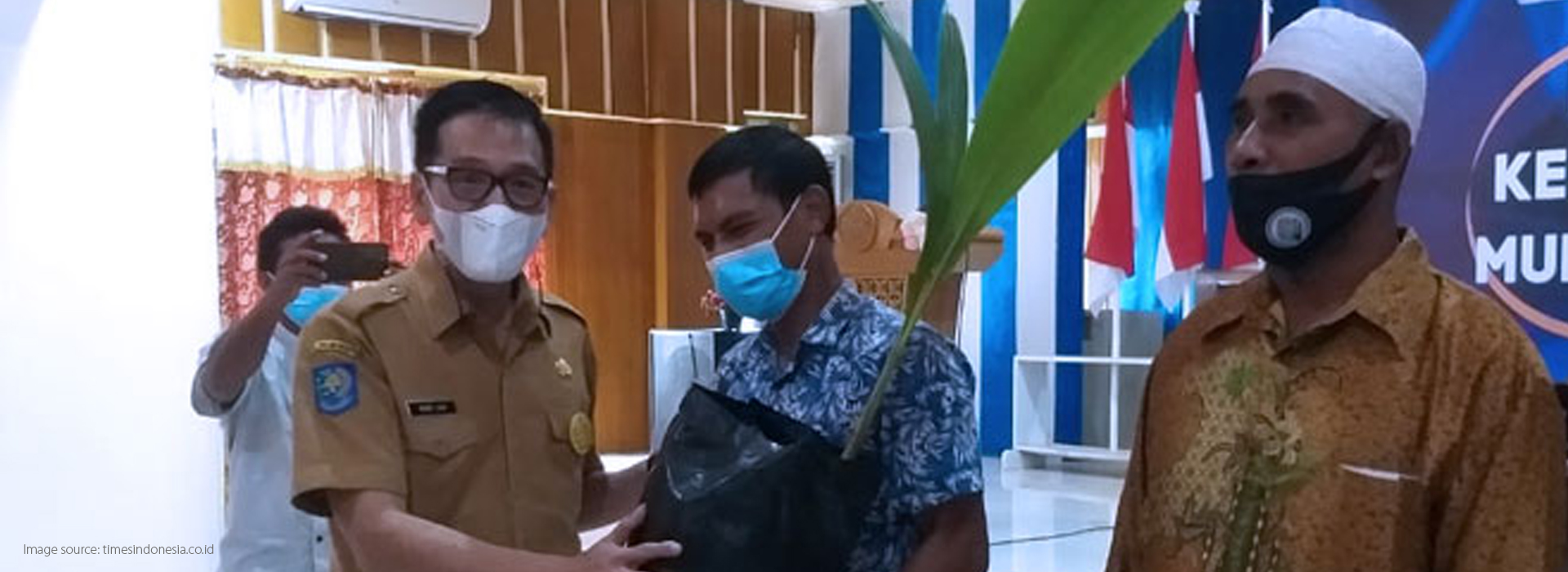Following up on the results of the working visit of the Minister of National Development Planning/Head of Bappenas to North Sulawesi during November 2020, in a series of working visits, Regional Development Planning Agency (Bappeda) and National Development Planning Agency (Bappenas), in collaboration with the Morotai Island Regency Government have formed a Multi-Stakeholder Partnership (Kerja sama Multi-Pihak/KMP) Forum in the coconut sector.
The result is an action plan of improving coconut farmers’ welfare through replanting and rehabilitation programs for superior coconut varieties, including Kelapa Bido in the Morotai Island Regency. In this regard, a Multi-Stakeholder Partnership Forum (KMP) in the Coconut Sector Commodity in Morotai Island Regency conducted a hybrid dialogue, took place on the Second Floor of the Morotai Island DPRD Office Hall, North Maluku, which was also conducted in the online platform, on 2 November 2021.


This activity will be a pilot South-South and Triangular Cooperation (SSTC) with countries in the Pacific region as ProPN Ministry of National Development Planning/Bappenas. ICC was invited to the Forum. Previously, in March 2021 the ICC Executive Director and Assitant Director of ICC together with a team of researchers from the Indonesian Palm Crop Research Institute visited the Bido village, 30 km away from the Pandanga, Morotai, North Maluku, where the variety of Bido was planted, and collected plant and insects samples in areas in Morotai showing a phytoplasma-related symptom to be identified in a laboratory in Bogor.


In his welcome address, Morotai Island Regent, Mr. Benny Laos underlined the advantages, research and development, and prospects of Bido coconut, as a value-added product that can be an alternative for copra commodities whose prices fluctuate. He mentioned, “Bido coconut can be a solution for the welfare of coconut farmers in Morotai because Bido coconut is faster to bear fruit. People are also easier to manage because the trees are short and easier to harvest, bear fruit faster, and the fruit size is bigger. We will rejuvenate the Bido coconut in Morotai.”
Dr. Ir. Slamet Soedarsono, Vice Director of Politic Law Defense and Security, National Development Planning Agency, delivered the opening speech. He mentioned, “Bappenas considers that coconut tree is a strategic commodity that needs to be prioritized because Indonesia is one of the world's largest coconut producers. The Multi-Stakeholders Partnership is an acceleration of inclusive development, one of which is by a downstreaming the process, to increase the Bido coconut population as an accelerator to improve people's welfare.”
In her remarks, Dr. Katinka Weinberger, Chief of Environment and Development Policy, UNESCAP, appreciated that Bappenas had led the way by establishing a National Multi-stakeholder Partnership Initiative in late 2019. There's a very good potential for partnership models in key sectors in Indonesia, and then to be used in other parts of Indonesia. Partnerships for coconut Bido can become a partnership model in the future of Indonesia, which creates a wider impact across the society that would not have been achieved otherwise, if any of the partners worked alone. Partnerships along the agricultural value chains are especially important. They can change livelihoods and help to create prosperity and stability.
The panel discussion moderator was Head of Regional Development Planning Agency (Bappeda), Morotai Island Regency, Ir. H.M. Thamrin Fabanyo M.T.P. In this event was also handed over 400 Bido Dalam coconut seeds to representatives of the Farmer Groups of the Morotai Island Regency.

